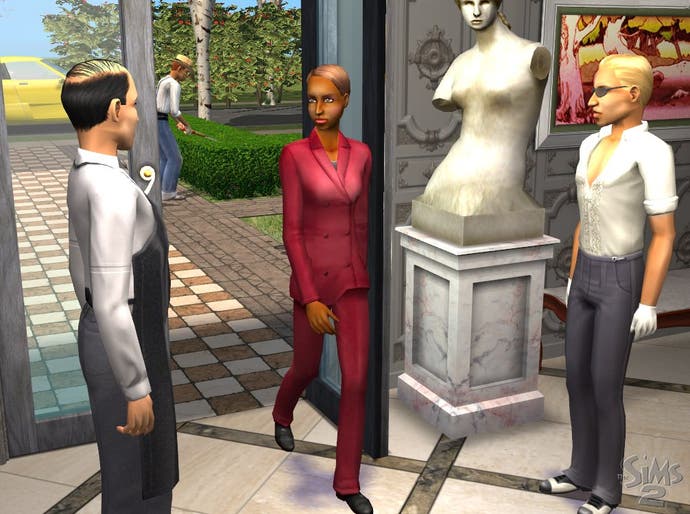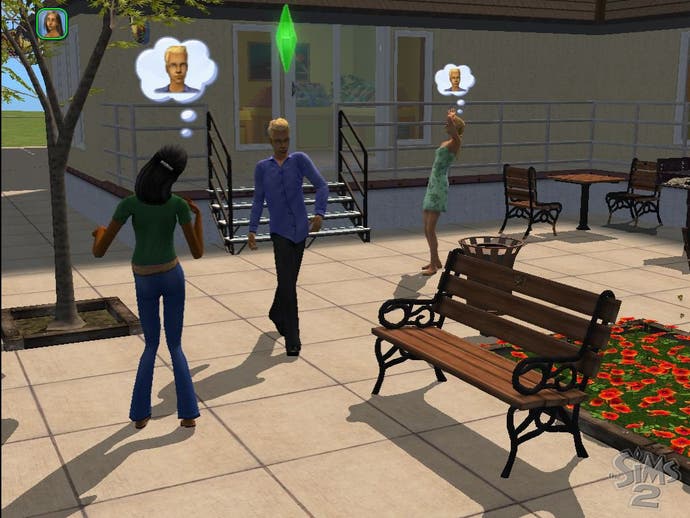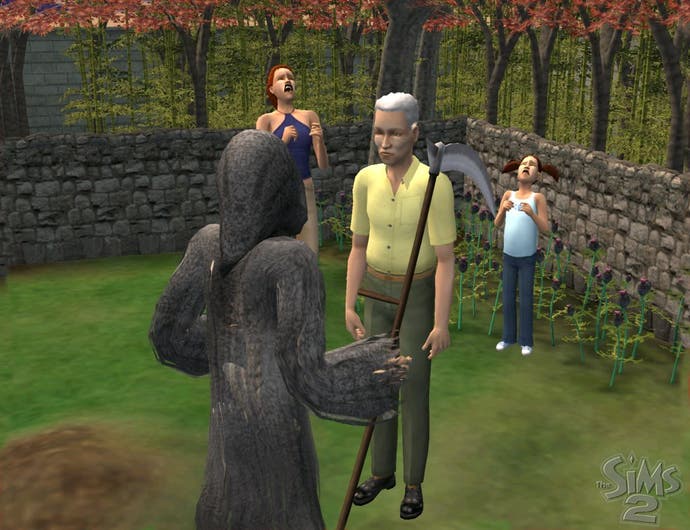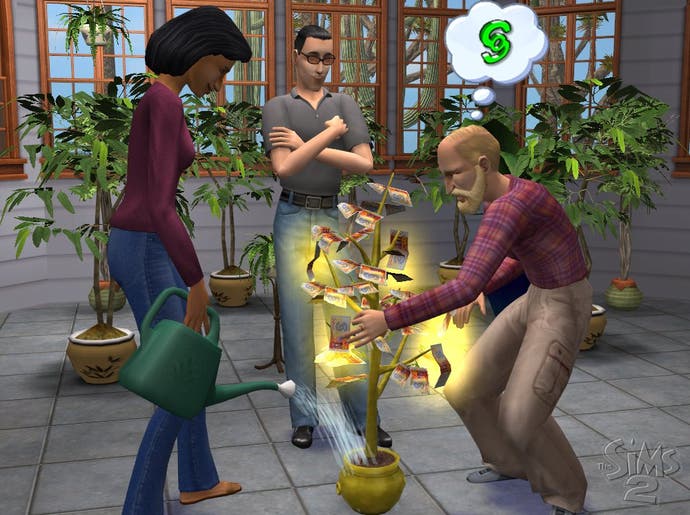The Sims 2
A step on the path to an interactive sitcom, according to Maxis' Neil Young, as he demonstrates his Sim Fawlty Towers scenario and more to the Edinburgh Games Festival.
Order yours now from Simply Games.
Everyone knows the Sims story by now, and it's a familiar story that's been repeated many, many times. Boy buys game, boy plays game, boy thinks it's fun for a while but ultimately tires of it within days and craves a return to more manly pursuits involving aliens, nazis, car crashes and head-shooting. Girl sees boy playing game while he's neglecting her needs at that bloody computer. Girl is intrigued, girl surreptitiously tries out game. A fortnight later, boy is having to practically beg to be allowed to check his email just for five minutes, and is scanning the low-end PC market for a bargain in desperation.
Yes, that was The Sims. The story doesn't end there, of course. There's an entire chapter where Girl goes out and tells all her friends about the game, and soon they're all tormenting the males in their lives by using the ninja rig he assembled in order to lay down the smack in Quake 3 as an incubator for little computer people. Then there's the moment where boy realises that this could be a good thing, since EA is planning on churning out enough expansion packs that he's sorted for birthday and Christmas present ideas for the next three years.
One chapter you might not know about is the prologue - the part of the story which seems almost ludicrous in light of the 40 million copies sold worldwide by the Sims and its associated expansion packs, bundles and whatnot to date. The fact is that Will Wright, creator of the whole SimWhatever franchise and philosophical parent figure to billions of little sims, fought tooth and nail for a long time to get The Sims green lighted by Electronic Arts - and even then, they simply didn't predict the whole part of the story after "boy buys game, boy brings back game on ten day return policy." Their initial projection for sales of The Sims came in at under 160,000 units, so there must have been some red faces in Redwood Shores when the sales figures started rolling back in - albeit red faces with big, happy smiles on them.
Northern Exposure

The Sims 2, then, comes with something more of a weight of expectation than its predecessor did. Just ahead of the game going gold at EA's now-internal Maxis studio, it was given its first public airing in a rainy and windswept Edinburgh, where Maxis general manager (and Brit ex-pat) Neil Young took the stage in the city's Odeon Lothian Road cinema and gave the general public their first ever glimpse of how his team plans to top the achievements of the best selling PC game in history.
After a short presentation about the concept behind The Sims and the success of the series, Neil launched straight into the philosophy of The Sims 2. For once, it seems, this isn't a sequel which is just about being bigger, faster and having more explosions; EA has exhausted most of those routes with its endless stream of expansion packs. And while The Sims 2 is in glorious 3D, and really does look very spangly, it's not just about applying a fresh lick of polygon loving to an existing game either. In a move which cynics might say is very un-EA, Maxis have taken The Sims back to its roots, and aimed for a genuine evolution of the entire concept, rather than just an upgrade.
Neil explained this by reference to a diagram which will be familiar to any students of economics, or indeed philosophy, in the audience - Maslow's hierarchy of human needs, a pyramid of our basic motivations which starts out with fundamental biological needs at the bottom, and works up through desires such as security and status towards concepts like dreams and aspirations at the top. The theory (as we understand it) is that once one level of this pyramid is satisfied, a person instantly starts to crave the things above it; and The Sims 2 is all about upping the ante and focusing on higher levels of the pyramid than its predecessor.
Motivating Maslow

To explain; in The Sims, while there was a general desire to make money, increase your status and Buy Cool Stuff (which has basically been the central motivation for humanity since the invention of the Walkman), the fact is that you spent rather a lot of time dealing with the bottom of Maslow's pyramid. Your Sims weren't terribly self-sufficient, or bright - they needed to be chaperoned around tasks like going to the toilet, washing, eating and sleeping. In The Sims 2, if what your heart really desires is to take iron-fisted control over your sims' crapping schedule, that's entirely possible, but the game has added a new focus higher up the pyramid that you can choose to follow - giving each tiny sim hopes, dreams and desires that you can work to fulfil.
All of these dreams appear in a box at the bottom of the screen when you click on a Sim, and they can range from moment to moment desires - like, "I really wish I could eat a turkey sandwich" - through to medium term goals, such as "I very much like the idea of making whoopie with that attractive sim", through to very long term aspirations about position, status or possessions. Meeting the criteria for these desires fills up a happiness bar on your sim, and earns points which can be used to buy unique objects - including new additions such as The Money Tree, which directly contradicts everything my parents ever told me about finance.
The overall effect is to give the game much more direction and focus, without preventing players from enjoying the sort of free-form gameplay that made The Sims popular in the first place. Neil Young believes that male players, in particular, will far prefer being given a set of short, medium and long term goals to fulfil, rather than simply being dumped into Simsville and told to get on with it - while the new focus on rather more important life goals than being tired or wanting to take a leak should also help to make the game interesting for many people who might formerly have disregarded it.
Supercharged Sitcom

One of the recurring themes in Neil's presentation about The Sims 2 was the idea of creating a game which is essentially a sitcom that you control. The Sims, he said, was the first game in the people simulation genre; The Sims 3, at some indeterminate point in the future, will - in his mind, at least - be the first user-controlled sitcom. The Sims 2 certainly lies somewhere along the path to that goal, and there's a surprising level of cinematic influence in how the game looks and plays. In fact, there's even a mode which puts you behind the camera as a director and lets you create your own Sim movies featuring the characters from your game, which can then be distributed to other fans over the Internet. It's a nod to both the odd subculture of creating movies in game engines which originally grew up around Quake, and the enormous wave of Sim fanfiction, role-playing and mod creation that has swept across the net in the past few years, and it has all the hallmarks of a phenomenon in the making.
Nowhere was the sitcom influence more clear, however, than in the live demonstration which Neil chose to show the audience in Edinburgh. The Maxis team had created a house modelled after Fawlty Towers, and populated it with characters from the Fawlty Towers cast - albeit with certain changes, such as Manuel suddenly finding himself in the guise of a sexy Spanish girl in a fetish-friendly maid uniform. As Neil played through this scenario, demonstrating the way that the desires system works (Basil was particularly keen on bedding as many of the young ladies in the house as possible, while on his "fears" bar, being found doing so by Cybil rated highly), the game managed to set up a host of amusing, sitcom-style moments without anything but the gentlest of prompting.
Some of this is truly emergent behaviour - it's simply funny to watch these characters, with their surprisingly human impulses, living out their exaggerated lives. Other elements are very deliberate indeed. Upon successfully initiating a bit of nookie with another character, a custom animation would play, utilising the new 3D engine's capacity for facial expressions to the utmost to give the camera some salacious winks while a highly unlikely love scene played out. All PG-rated, we should add, and far more Carry On than Debbie Does Dallas - this is good clean fun for all the family, but it definitely is funny. Similarly, when fights developed into something more than Basil being slapped around a bit, the game launched a cartoon-influenced animation of a dust cloud with arms, legs and heads poking out, in true Looney Tunes style.
Family Values

One of the richest veins of comedy for sitcoms through the years has always been family relationships, and here, again, the planets have aligned for The Sims 2. Unlike its predecessor, where you largely managed a static group of sims who didn't really age or develop, The Sims 2 allows sims to be born, grow up, have children, grow old and die - and their happiness, affluence and success even goes so far as to influence their lifespans. The game implements a form of DNA which allows sims to breed and passes on characteristics to their children, while growing old will, as you might expect, have a fairly major influence on the type of desires and dreams your character has.
It would have been so easy for EA to turn around and make a quick, dirty sequel for The Sims by tacking on expansion pack style content and a spangly new 3D engine. In some ways, this makes The Sims 2 even more impressive - it's a genuine evolution of the whole concept, which brings the basic concepts behind The Sims to a new level and adds gameplay and interface elements which the original game never concieved of. You're no longer overseeing a flat full of unaging characters, you're overseeing a family dynasty. Your sims are no longer automatons whose greatest desire in life is to eat and crap, but real characters with desires and fears that they can communicate to you. And the humour which was in many ways emergent in the original game has been honed, refined and distilled into something much finer, but just as unpredictable as before.
The audience in Edinburgh loved The Sims 2. Young and old alike were enthralled by the game, and Neil Young's presentation drew more laughs than many comedy films that have graced the Odeon's big screen. EA seem determined to create a title which will pull back the heartland male gamers, while still having much to offer to The Sims' unique set of fans. It's a tall order, and we won't know for sure how well they've done until we finally get our hands on review code later this month. For now, though, all the signs are pointing at a game which will not only be hugely commercialy successful, but might just be a lot more interesting to hardcore gamers than any of them would believe.
Order yours now from Simply Games.




.png?width=291&height=164&fit=crop&quality=80&format=jpg&auto=webp)



